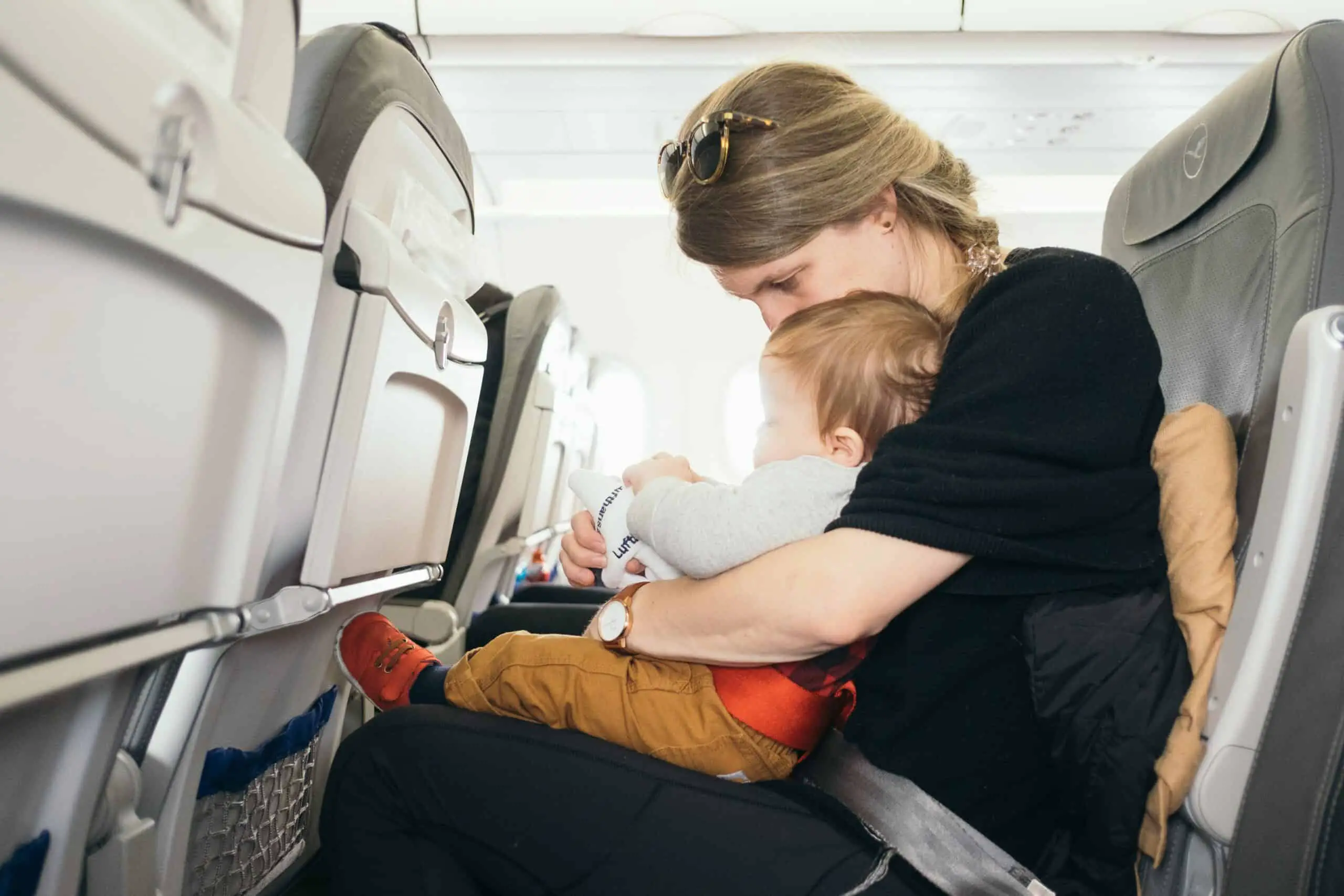Flying in an airplane can be an unnerving experience all on its own. If you’re traveling with a newborn, you might be apprehensive about how to keep your baby safe and protected during a flight. This might leave you with the burning question, should babies wear earmuffs on planes?
Babies should wear earmuffs on planes. The pressure difference can cause a baby’s ears to pop during air travel, causing a painful feeling. The best way to keep your young child’s ears comfortable on a plane is to provide them with ear protection, such as earplugs or earmuffs.
The following sections will answer in further detail the question of if babies should wear earmuffs on planes. More information about changes in air pressure during flights, what kind of ear protection to use to protect your child best, and potential air travel risks for infant children, will also be discussed.
Why Babies Need Ear Protection During Air Travel

During a flight, the plane and cabin will have fluctuating air pressure.
This happens especially during the initial take-off and descent of the aircraft. Not only does the pressure vary as time goes on, but flying in a plane is also notoriously a noisy form of transportation, meaning your baby may be exposed to loud noises for an extended time.
There’s no direct evidence that states that a young child flying in a plane will cause immediate damage or harm to their ears or any of the functioning parts of their hearing structure. However, the loud noises and alterations in air pressure can cause some discomfort, which can be very painful if not properly attended to.
Not every baby will experience ear pain during a flight.
Some infants or children may have more sensitive ears compared to others. If you’re concerned about bringing your baby on an airplane, be sure to talk to your doctor or primary caregiver to make sure it’s okay that they travel in the air with you.
While most of the time, it’s perfectly safe, some factors might make it more dangerous for your baby to fly.
What Kind of Ear Protection an Infant Should Use on a Flight
When it comes to protecting your baby’s ears and hearing while traveling in an airplane, there are several “do’s” and “don’ts” to be aware of.
Don’t Use Cotton Balls or Swabs
Don’t use cotton swabs or cotton balls as ear protection on an airplane. Cotton is friable and has the potential to fall out of your baby’s ear easily. In addition, if the cotton is placed too deeply, it could get stuck in the ear canal and cause damage.
Cotton can also quickly become a choking hazard if a cotton ball or swab were to fall out of your baby’s ear and accidentally end up in their mouth.
Use EarMuffs
One perfectly acceptable option for ear protection on a flight is a pair of insulated earmuffs.
These will dampen the effect of the loud noises produced by the plane and lessen the change in air pressure your child will feel. The headband of an earmuff is also sure to keep the protection secure on your infant’s head.
If you’re looking for some product recommendations, check out the ones below, which are available on Amazon.com:
- Friday Baby Baby Ear Protection: Noise-canceling headphones designed for newborns, infants, and toddlers. This product is equipped with soft padded cushions and is made from non-toxic plastic.
- BBTKCARE Baby Headphones: Zero-pressure noise-reducing headphones for babies 3 months of age up to 2 years.
Bring a Pacifier or Bottle
If you’re apprehensive about using headphones for your baby on a flight, another way you might be able to equalize and relieve the pressure in your baby’s ears is to bring a pacifier or bottle for them to suck on.
Since infants don’t understand the concept or mechanism of “popping your ears,” sucking on either of these objects will help them pop their ears independently.
When It Might Be Dangerous for Your Baby To Fly
As mentioned above, it’s perfectly safe for your infant or toddler to travel on an airplane with you most of the time. However, there are certain circumstances where you may want to avoid air travel with your baby. The following reasons might prevent your child from flying on a plane.
Your Baby Is Too Young
One of the reasons it may not be a good idea for your child to fly on a plane is because they’re too young. A plane is essentially an airtight box, which means that any infections, germs, or potential diseases are pretty literally sitting there waiting for you to catch them.
If you consider bringing a newborn on a flight with you, you may want to hold off until they’re older.
Newborn babies don’t have developed immune systems. They cannot fight sickness and are far more susceptible and vulnerable to catching severe infections than older children or adults.
Pediatricians have varying recommendations for the appropriate infant age to fly.
Some suggest it’s perfectly fine after 2 weeks of age, while others recommend waiting until between 4-6 months. This all depends on you and your child’s health circumstances or potential underlying conditions.
To be sure about when it’s okay for your child to fly, ask your doctor.
Your Baby Has Recently Been Sick
If your baby has recently been sick, it may not be a good idea to bring them on a flight. Fighting an illness means your baby’s immune system is weakened, which is another reason they may become more susceptible to additional infections or diseases.
Another reason your baby shouldn’t fly is if they have recently had an ear infection or ear surgery. Both of these circumstances have the potential to exacerbate any pain or discomfort your infant experiences during the flight due to changes in air pressure.
Conclusion
When you’re traveling with your little ones, it can be stressful enough to just try getting their gear on the plane. But when your baby is upset from the atmospheric pressure of flying, it can make your trip downright miserable.
Follow the tips in this article to give yourself a chance to have a better trip.
Sources
- Mayo Clinic: Is air travel safe for an infant?
- Winchester Hospital: Traveling with a Newborn Baby: By Plane
- Parents: How Old Does a Baby Have to Be to Fly?


